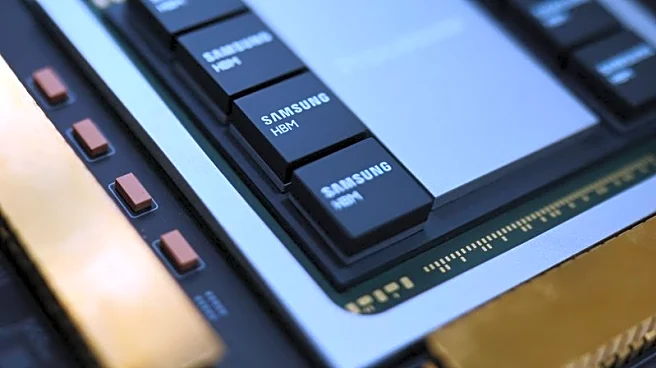What is the story about?
What's Happening?
Cambricon, a semiconductor firm based in China, has reported a significant increase in revenue, surging by approximately 4,300% in the first half of the year. This growth highlights the increasing competition Nvidia faces in the Chinese market, as local companies seek to fill the void left by U.S. export restrictions. Nvidia recorded no sales of its H20 chips to China in the second quarter, a consequence of these restrictions. Cambricon, partially state-owned and headquartered in Beijing, has become China's most expensive stock, surpassing Kweichow Moutai. Despite its growth, Cambricon's revenue remains significantly lower than Nvidia's, which reported $46.7 billion in the second quarter. The U.S. export controls, enforced earlier this year, initially banned H20 chip sales to China, but the ban was lifted in July, allowing time for innovation.
Why It's Important?
The rise of Cambricon and other Chinese semiconductor firms poses a challenge to Nvidia and the U.S. semiconductor industry. As China pushes for self-sufficiency in technology, local companies like Huawei and SMIC are rapidly catching up to Nvidia in terms of product quality and production capacity. This shift could impact Nvidia's market share and the U.S. government's goal of maintaining global AI dominance. The export restrictions have inadvertently fueled innovation among Chinese competitors, potentially closing the technological gap over time. The geopolitical tensions and regulatory hurdles faced by Nvidia highlight the complexities of international trade and technology development.
What's Next?
Nvidia aims to resume H20 chip sales in China and expand its product line by introducing the high-performance Blackwell chip, pending U.S. government approval. The company is advocating for the approval of Blackwell for the Chinese market, which could help regain lost revenue. Meanwhile, Chinese companies are expected to continue innovating and improving their technology, potentially increasing competition in the semiconductor industry. The U.S. government and Nvidia are also negotiating an agreement requiring Nvidia to share 15% of its revenue from H20 chip sales to China.
Beyond the Headlines
The situation underscores the broader implications of geopolitical tensions on technology and trade. The U.S. export restrictions have not only affected Nvidia's business but also accelerated China's efforts to achieve technological independence. This development could lead to long-term shifts in the global semiconductor industry, with potential impacts on international relations and economic policies.















